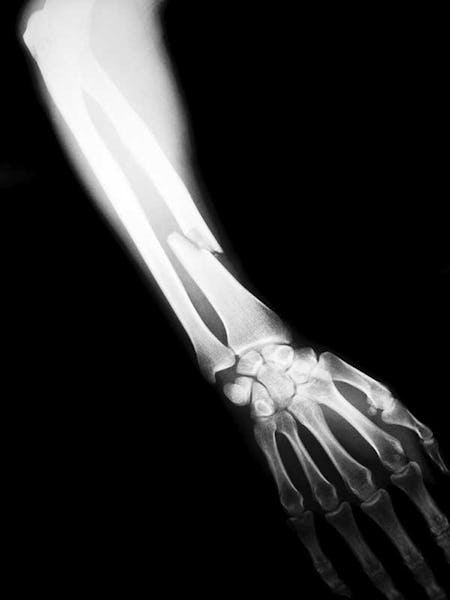Let’s play a quick word association game. When we say “muscle,” what supplement do you think of taking to support it?
You probably said whey protein. Now, what supplement would you take for energy in the gym? A pre-workout, right?
And what if you wanted better, more durable bones that could withstand impact and support your body through the most grueling training?
More than likely, you’re thinking of calcium, but, the truth is, you’re only half right. Strontium should come to mind too. And, perhaps after you read this article, it will from now on.
Strontium: The Forgotten Mineral For Strong Bones
Though largely overlooked by nutrition experts, strontium plays a critical role in making bones the steel girders of the body, and adding it to your supplement regimen may make you feel unbreakable.
What Is Strontium?
Strontium may be the best mineral that you’ve never heard of. For as ubiquitous as it is, it’s strange that it doesn’t get more press. In case it ever comes up in a game of Trivial Pursuit, strontium is the most abundant trace element in ocean water. It’s also found in soil and is present in many foods, including fish, whole grains, beans, spinach, root vegetables, and dairy foods.
More than 99% of the strontium in the human body is stored in bones and teeth, making it similar to calcium in its importance for their health. As a result, strontium supplementation has been studied for its effects on bones, and it has been recommended as a bone-health supplement since the 1890s.
Strontium Benefits
According to a 2012 report by the U.S. Consumer Product Safety Commission’s National Electronic Injury Surveillance System (NEISS), damages to bones are the most common injuries among athletes aged 25 to 40 who play basketball, soccer, football, and baseball. The knees, ankles, and fingers were found to be the most likely casualties.
The results of several long-term trials suggest that having more strontium in your system may boost bone mineral density, and thus your bones’ resilience. This makes strontium valuable to athletes who participate in high-impact sports, such as those listed above (as well as mixed martial arts, where the impact from hitting pads, the mat, and an opponent’s face can take its toll). It’s also critical for older individuals who face bone health problems associated with aging. Below are some of the key findings in support of strontium.
â A study in the journal Bone found that eight years of daily strontium intake promoted continual increases in bone mineral density.
â Arthritis & Rheumatology noted that, in a study of 2,714 women over five years, strontium aided in the reduction of bone damage incidences.
â The New England Journal of Medicine found that strontium supported a 41% lower risk of bone damage in subjects after three years.
â According to the Journal of Bone and Mineral Research, strontium was shown to help mitigate damage to the vertebrae of the spine by an average of 37% after three years. This effect was independent of the subjects’ age and initial bone mineral density, and applied to the most common forms of vertebral bone injury.
â A 2013 study in the Journal of Clinical Endocrinology and Metabolism discovered that strontium stimulated greater bone mineral density in the lumbar spine in men over a two-year period than in subjects who received a placebo.
As to the mechanisms that make strontium so effective, scientists aren’t sure. But a review in Calcified Tissue International revealed that strontium appears to regulate the breakdown of bone cells while promoting the birth of new cells, fortifying the bone’s structure. Further evidence in the Journal of Bone and Mineral Research suggests that strontium can stimulate a remodeling of the bones’ architecture, making them more durable than before.
Is Strontium Safe?
In spite of its benefits, skeptics still have a bone to pick with strontium about whether it’s safe as a supplement. Some research has shown that it could raise the risk of cardiovascular problems. However, these trials were done on people who were found to have already had poor cardiovascular health. A 2014 review in Expert Opinion on Drug Safety concluded that increased risk was detected in randomized controlled trials “but not in real life,” and recommended that patients with cardiovascular contraindications be excluded from future strontium research studies.
Another review from 2013 stated that strontium “has a good tolerability and safety profile in long-term studies.” And, that same year, a 32-month study of more than 12,000 people using strontium did not report a single cardiac safety issue. Based on all that, it seems fair to say that if you have a heart condition, you may want to avoid strontium. But if your doctor says you’re healthy, it’s probably not going to make you any worse.
Another critique of strontium is that the research showing that it boosts bone mineral density is based on the volume added by strontium’s high atomic weight. So, in effect, critics allege that you’re essentially adding fluff to the bones when you supplement with it and not dense bone tissue. While it’s true that strontium doesn’t stimulate bone mass as much as scientists once thought, it still has a significant effect. For example, a New England Journal of Medicine study initially reported that, after 36 months, subjects on strontium had experienced a 14.4% boost in bone mineral density. However, a follow-up article in the British Medical Journal adjusted for strontium’s atomic weight and concluded that the gain was actually 8.1%—not as dramatic as originally reported, but impressive nonetheless. From the journal: “An increase of 5% in spine bone mineral density is required to confirm a notable response to treatment.”
When Should I Take Strontium?
As with whey protein and pre-workout powders, the time at which you ingest strontium seems to influence its effectiveness. Your body is constantly renewing itself by sloughing off old cells and producing new ones, and scientists think that bone breakdown rates peak at night. Taking strontium before bed may allow it to best do its job.


)





